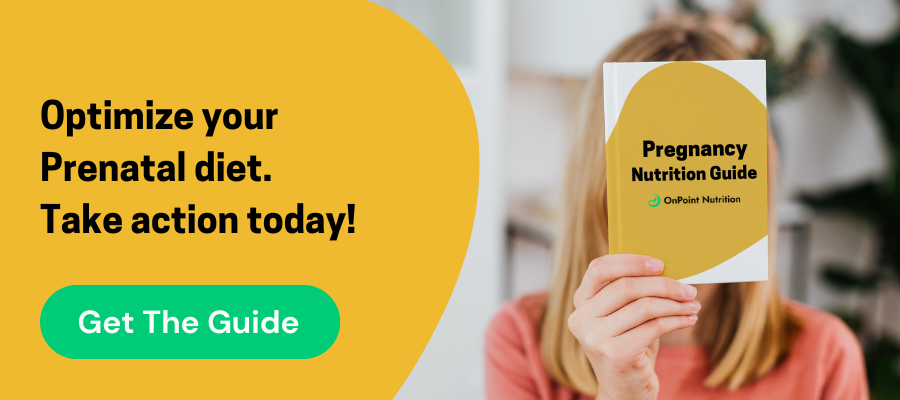
What you eat, your baby eats, so optimizing nutrition during pregnancy is vital for both moms-to-be and their babies. While there isn’t a magic formula for perfect pregnancy nutrition, including key foods and beneficial nutrients will nourish you and your baby through this important time in both of your lives.
Eating a balanced diet is ideal for everyone, but even more important during pregnancy. In general, eat a varied diet that contains nutrient-dense foods such as (link to healthy foods for pregnancy blog):
- Fruits and vegetables for vitamins, minerals, and fiber.
- Complex carbohydrates for iron, B vitamins, folate, and fiber.
- Lean proteins for your baby’s optimal growth and development.
- Healthy fats to meet your energy needs and support your baby’s brain development.
Certain micronutrients, including vitamins and minerals, are important for optimal health during pregnancy. Essential nutrients include:
- Vitamin A for your baby’s eyes and immune system.
- Vitamin D for your baby’s bone development.
- Calcium works with vitamin D to form your baby’s teeth, bones, muscles, heart, and nerves.
- Choline for your baby’s brain development.
- Folate for your baby’s developing brain and spinal cord.
- Iron to support your increased blood supply as a mom-to-be.
10 Pregnancy Super Foods
Some foods pack an especially strong nutrient punch and can really help you achieve your nutritional goals during pregnancy. We consider these to be pregnancy superfoods.
- Asparagus contains a significant amount of folate, necessary for your baby’s nervous system. It is also high in iron to help meet your increased iron needs during pregnancy.
- Leafy greens, including spinach, kale, and broccoli, are great for pregnancy. These vegetables contain calcium, folate, iron, and fiber. Additionally, they contain vitamins A and C to support you and your baby.
- Sweet potatoes are complex carbohydrates packed with fiber and vitamin A. They also contain vitamin C and folate to support your pregnancy.
- Whole grains, including brown rice, quinoa, oats, as well as whole wheat bread and pasta, are good fiber sources. These grains also contain various B vitamins. Grains are usually well-tolerated when battling pregnancy nausea and may help you meet your energy needs each day (link nausea during pregnancy blog).
- Salmon and other fatty fish contain omega-3 fatty acids for your baby’s brain development. More specifically, the omega-3 fatty acid, docosahexaenoic acid (DHA), is crucial for your baby’s brain formation. Fatty fish are also good protein, calcium, and vitamin D sources.Important Note: some fish are more likely to contain high levels of mercury. However, do not let this risk scare you away from fish entirely! Experts recommend that pregnant women consume between 8 and 12 ounces of low mercury seafood each week to obtain omega-3s and DHA. Safer fish choices include salmon, cod, tilapia, haddock, shrimp, and canned light tuna.
- Meat, specifically lean meats and poultry, are dense protein, choline, and iron sources. While all meats are high in iron, red meats contain more iron than poultry and may help you meet your increased iron needs throughout pregnancy.
- Eggs are one of the densest choline sources necessary for your baby’s brain to form. However, many prenatal vitamins do not contain choline, leaving pregnant women at risk of not getting enough. Regularly eating eggs helps ensure you get enough choline, as well as protein and vitamin D.
- Greek yogurt, cottage cheese, and other dairy products provide your body with protein, calcium, and vitamin D. Additionally, consuming full-fat dairy (yogurt and milk) provides your body with the fat needed to absorb vitamins A, D, E, and K. It will also help keep you full for longer than nonfat or low-fat dairy.
- Beans and legumes provide your body with fiber, protein, calcium, folate, and iron. They are also great foods to include if you are experiencing aversions to animal proteins, which is common during pregnancy (link to food aversions during pregnancy blog).
- Pumpkin seeds are a great fiber, protein, and iron source. They also provide the body with magnesium, which has many functions in your body and your baby’s body. Adding pumpkin seeds to salads with dark leafy greens or trail mix boosts your meals and snacks.
Super Food Meal Combos
Combining the above foods is a great way to nourish yourself and your baby. A few meal combinations to try include:
- An omelet with spinach
- Greek yogurt with pumpkin seed granola
- A salad with kale, quinoa, chicken, lentils, and pumpkin seeds
- A baked sweet potato with roasted broccoli and chickpeas
- A bowl with salmon, asparagus, and brown rice
While it’s not a food, your prenatal vitamin is a key part of optimizing your health and your baby’s health. Prenatal vitamins provide you and your baby with all of the essential nutrients during pregnancy and ensure you are getting them every day. If you need support deciding which prenatal to take, talk to your doctor or dietitian.
Your Pregnancy
Incorporate these foods into your pregnancy diet to maximize your nutrient intake throughout pregnancy. Use this superfood list to guide your decisions. Also, listen to your body throughout your pregnancy and meet with your doctor and dietitian regularly.
If any of these foods do not work for you in this stage of life, do not stress. Food aversions are common during pregnancy (link to food aversions during pregnancy blog). Simply talk with your doctor or dietitian about getting the nutrients you and your baby need in a way that feels good to you.
What To Do Next
If you are looking for a little extra support during this big transition, we are here to help! Our team of dietitians and nutritionists is here to guide you through a healthy pregnancy for you and your baby!

Topics

Britney Kennedy is the founder and CEO of OnPoint Nutrition. Since opening in 2016, she and her team have helped over 2,500 individuals become happier, healthier more confident versions of themselves.




